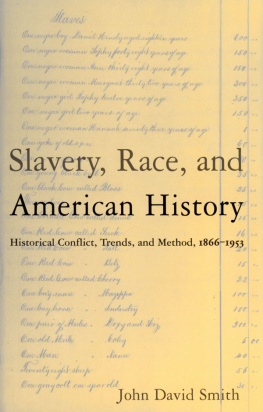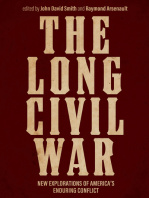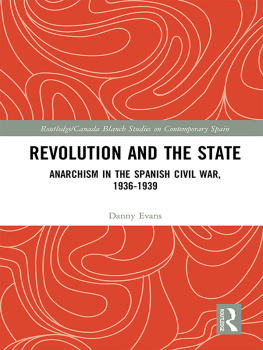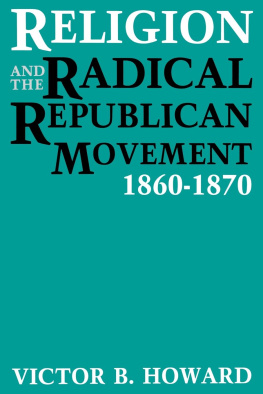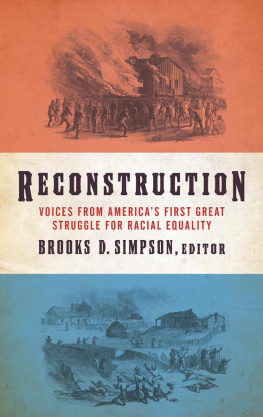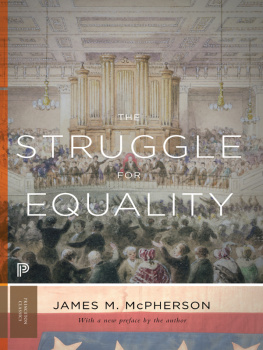UNDAUNTED RADICAL
CONFLICTING WORLDS
New Dimensions of the American Civil War
T. Michael Parrish, Series Editor

Albion Winegar Tourge (18381905)
Photograph by Mathew Brady, from PictureHistory
UNDAUNTED RADICAL
THE SELECTED WRITINGS AND SPEECHES OF
ALBION W. TOURGE
EDITED BY MARK ELLIOTT AND JOHN DAVID SMITH

Published with the assistance of the V. Ray Cardozier Fund
Published by Louisiana State University Press
Copyright 2010 by Louisiana State University Press
All rights reserved
Manufactured in the United States of America
LSU Press Paperback Original
First printing
Designer: Michelle A. Neustrom
Typefaces: Adobe Caslon Pro, text; AT Sackers Roman, display
Printer and binder: Thomson-Shore, Inc.
LIBRARY OF CONGRESS CATALOGING-IN-PUBLICATION DATA
Tourge, Albion Winegar, 18381905.
[Selections. 2010]
Undaunted radical : the selected writings and speeches of Albion W. Tourge / edited by Mark Elliott and John David Smith.
p. cm. (Conflicting worlds)
Includes bibliographical references and index.
ISBN 978-0-8071-3593-8 (pbk. : alk. paper) 1. African AmericansCivil rightsHistory 19th century. 2. United StatesRace relationsHistory. 3. AbolitionistsUnited States History. 4. Reconstruction (U.S. history, 18651877) I.
Elliott, Mark Emory, 1969II. Smith, John David. III. Title.
PS3088.U54 2010
813.4dc22 2009040747
The paper in this book meets the guidelines for permanence and durability
of the Committee on Production Guidelines for Book Longevity
of the Council on Library Resources.
To Emory B. Elliott, Jr.M.E.
To Tessa Riley AndrusyszynJ.D.S.
CONTENTS
ACKNOWLEDGMENTS
The editors would like to thank those people and institutions who provided invaluable assistance in the preparation of this volume. Our thanks go to the Chautauqua County Historical Society, Westfield, New York; the Schomburg Center for Research in Black Culture; Donna Toscano, Debbie Killen, Kathy Sheridan, and Dennis Schwab of Wagner College, who assisted with the laborious work of transcription and scanning from imperfect original documents; Perry McKenzie of the University of North Carolina at Greensboro, who copyedited the entire manuscript; Lisa F. Andrusyszyn and Barbara J. Black of the University of North Carolina at Charlotte, who provided valuable editorial and secretarial support; Carolyn L. Karcher and Otto H. Olsen, who offered their enthusiasm and editorial advice; and David W. Blight, whose initial suggestion sparked this project. The editors would also like to thank Conflicting Worlds series editor T. Michael Parrish as well as Rand Dotson, George Roupe, and Catherine L. Kadair of Louisiana State University Press for their interest in our work and for navigating the manuscript through the publication process. Linda Webster prepared the index. Mark Elliott would like to thank his family for its love and support, especially Kimberly Lutz, Zachary Elliott, and Nicholas Elliott. John David Smith thanks Sylvia A. Smith for her love and support on yet another project.
UNDAUNTED RADICAL
Introduction
Albion W. Tourge was among the foremost champions of racial equality in the nineteenth century. Though he was hardly the only white American of his time to believe that all men, regardless of race, were born equal and deserved equal rights and consideration, few could match the intensity and consistency with which he publicly proclaimed this doctrine. His creed was forged during a time when the nation was torn apart by the Civil War and confronted by the daunting social consequences of emancipation. In the 1860s, Tourge joined with radicals like Thaddeus Stevens, Wendell Phillips, Lydia Maria Child, and Charles Sumner in believing that the future of American democracy would be secure only when equal justice and equal citizenship were guaranteed for all Americans, including former slaves. Over the next three decades, Tourge argued on behalf of racial equality relentlessly, with increasing sophistication and depth, undeterred by fierce opposition. Although his name may not be familiar to Americans today, his writings offer some of the fullest articulations of color-blind citizenship as an ideal, and provide a penetrating look into the early debates about race and American citizenship that have continued into our time.
Tourge is probably best known to students of Reconstruction as the author of the powerful historical novel A Fools Errand (1879). A best-seller in its day, it remains a perennial favorite among assigned readings for college-level courses that deal with Reconstruction. The novel, drawn from his own experiences as an Ohio transplant in North Carolina, offered a gripping and historically accurate account of a Radical Republican in the South who allied with former slaves and battled to uphold the law against the political terrorism of the Ku Klux Klan. The books success, along with the popularity of its sequel, Bricks Without Straw (1880), transformed Tourge into a nationally recognized public figure and spokesman for southern Republicans. The present collection of writings and speeches, however, demonstrates that Tourges contribution to the national dialogue on race and citizenship went far beyond these two novels.
Tourge continued to be an outspoken activist for black advancement and civil rights until the 1890s, and he left behind a wealth of books, essays, lectures, and newspaper articles on the subject of equal rights. Among his achievements, he founded one of the nations first national civil rights organizations, framed the nations first successful antilynching law, and brought the first challenge to segregation before the United States Supreme Court in the 1896 case of Plessy v. Ferguson. By the 1890s, many Americans considered Tourge the new William Lloyd Garrison for the fervor with which he espoused racial equality. Much as they treated Garrison, unsympathetic whites also demonized Tourge as a maniacal instigator of sectional hatred.
An astute, even prophetic, social critic, Tourge has not received his due attention as an important public intellectual of the late nineteenth century. First, his work is a record of dissent against the rising tide of segregation, racial disfranchisement, lynching, and damaging racial propaganda and mythologies about slavery and the Civil War and Reconstruction. Though historians often portray postwar proslavery and pro-Confederate ideas as having gone virtually unchallenged by northern whites, Tourges writings, and their public visibility, demonstrate not only that vigorous resistance was possible, but that it constituted an integral part of the historical debate. Moreover, his writings offer profound insights into the legal, political, and social ways in which nineteenth-century Americans understood both race and citizenship and how the contested memory of the Civil War and Reconstruction shaped Americans views of the past and present. Finally, Tourges writings present an unflinching analysis of the hard choices reformers had to face to pursue momentous egalitarian reforms, reforms whose success depended upon a delicate mix of political principle and shrewd strategic calculation.
This collection of Tourges best writings seeks to disseminate his ideas to a wide audience and to demonstrate the importance of his views on a broad range of subjects. It highlights his significance not only for students of history, but also for those in literary studies, legal studies, religious studies, and cultural studies. Literary scholars have long included him among the select few authors who portrayed issues of race and African American history in complex ways. Legal historians have shown an increasing appreciation for Tourges visionary insights in the
Next page

